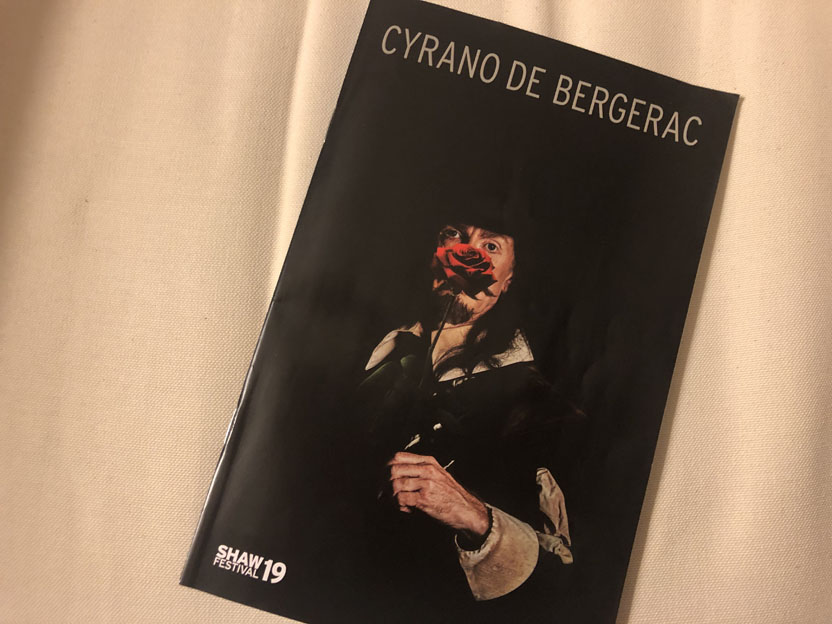
Cyrano De Bergerac at The Shaw Festival
Let’s start with the good news. The central story of Edmond Rostand’s 1897 Cyrano de Bergerac is alive and well in the capable hands of Tom Rooney as Cyrano, Deborah Hay as Roxanne, Jeff Irving as Christian, and Patrick Galligan as De Guiche. Moreover, playwright Kate Hennig, whose Tudor trilogy wrapped up this season at the Stratford Festival, has written a sleek prose adaptation that serves the story well.
Set during the tumultuous years of the seventeenth-century Thirty Years War, Rostand’s sprawling verse epic (the original had some 40 speaking parts and 60 named characters) tells the tale of the eponymous hero, an unequalled swordsman from Gascony possessed of an immense talent as a poet and an equally immense nose. He is enamored of his cousin Roxane, but because of his prominent proboscis he is ashamed to profess his love. Enter Christian, a hunky new guardsman also in love with Roxane, a feeling that is reciprocated. Unfortunately for Christian, Roxane wants more from a man than a pretty face, muscles, and flowing hair. She wants poetry and this is an area in which the tongue-tied Christian is sadly lacking. Complicating matters is the fact that Count De Guiche wants to marry Roxane off to Viscount Valvert.
When Cyrano realizes the depths of Roxane’s feelings for Christian he quashes his own, becoming Christian’s ghost writer, both in love letters and in a famous scene speaking from the shadows beneath her balcony. Cyrano arranges a secret marriage between Roxane and Christian. De Guiche, his plans thwarted, sends Christian and Cyrano to besiege Arras. Christian is killed in battle and Roxane enters a nunnery where the faithful Cyrano visits her weekly, never revealing his love. It is only in the play’s final moments, when Cyrano is dying, that Roxane accidentally discovers the truth.
Tom Rooney, one of Canada’s greatest actors, turns in yet another masterful performance as Cyrano. He makes Cyrano’s bravado, heroism, and pain all equally believable and touching. Deborah Hay, who has an uncanny ability to portray characters much younger than her chronological age, plays Roxane as a bit of an air head, but she does it so well that I, for one, was completely won over. Jeff Irving is ideally cast as Christian and Patrick Galligan’s De Guiche is much more than the cardboard villain we usually see. Chris Abraham, who is establishing himself as one of Canada’s most reliable directors, makes the most of the Royal George Theatre’s rather cramped spaces, using Julie Fox’s clever sets and costumes and Kimberly Purtell’s lighting to maximum effect.
The “bad” news is that this is not your father’s Cyrano de Bergerac. For one thing, the poetry is gone along with the cast of thousands . . . well, dozens. Hennig has also mandated that the play is to be performed by a cast of fourteen, observing strict gender parity protocol. Since the play calls for many more parts than fourteen, this results in an awful lot of doubling, not to mention gender bending, mostly female to male. I only noticed one brief scene in which a man played a woman.
The only actress who fares well in all this is Tanja Jacobs as Cyrano’s comrade in arms, Le Bret. She is fortunate in having to portray only one character throughout the play. That means she has the luxury of a well-made wig that gives her a believable receding hairline. Abundant facial hair and a portly costume that obscures her femininity add to the effect. Had she been able to lower her vocal range a bit more the illusion would have been complete. Hers is a first-rate performance.
The other actresses aren’t so lucky. They are forced to switch, often very quickly, from male to female to male to nun. This means unconvincing wigs and, from time to time, ridiculous black moustaches that can be stuck on and removed quickly. Some actresses present versions of “masculinity” that verge on parody, while others seem to have decided just to remain women wearing silly moustaches.
I wonder if in future productions Hennig will allow directors to expand the number of actors and use more gender-appropriate casting or if the current configuration is cast in stone.
Fortunately none of this interferes with the main story. Most of the core scenes involving the principles are quite intimate. If you can ignore the absurdities inherent in the gender-equity approach, you will find Hennig’s Cyrano de Bergerac a quite satisfying retelling of this timeless tale of unrequited love.
Cyrano de Bergerac continues in repertory at the Shaw Festival’s Royal George Theatre through October 20, 2019.
The Shaw Festival
www.shawfest.com
(800) 511-7429
(905) 468-2172
More Reviews
To access the complete archive of reviews listed alphabetically CLICK HERE.

